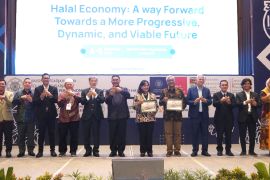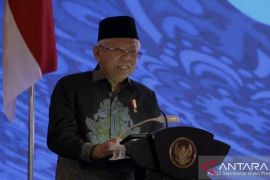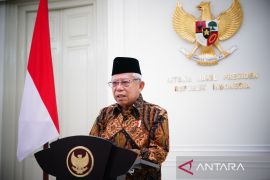Investing in the capital market carries risks. Therefore, young investors and retail must also increase their perceptions of the existing risks.Jakarta (ANTARA) - Vice President Ma'ruf Amin reminded young people, who have begun to invest in the capital market, not to get caught up in pom-pom stocks, which are subject to"blowing up" actions through irresponsible influencers on social media.
"Do not get trapped with rising financial products because of the blow-ups by some groups, which are currently rife with the phenomenon of using influencers," Amin said in a webinar on Capital Market Investment in Islamic Perspectives on Saturday.
Speaking at the webinar, held virtually by the University of Indonesia's (UI's) Faculty of Economics and Culture, he also urged young people to take advantage of the information and digital technology that is growing rapidly, as a way to develop the sharia economy and finance.
"The support of digital technology that facilitates financial transactions has provided opportunities for people to become part of capital market players, including the sharia capital markets," he pointed out.
He described pom-pom stock as a stock investment practice recommended by influencers on social media. The goal is to invite people to buy or sell shares that seem to promise profits, he added.
Most influencers who advertise pom-pom stocks do not actually understand how the investment works in the capital market, so the recommendation is not always based on analysis, Amin explained.
Related news: FSA: Ensuring safety of digital transactions amid COVID-19
Therefore, the vice president reminded young people to improve their capital market literacy, because these kinds of investments contain risks.
"Investing in the capital market carries risks. Therefore, young investors and retail must also increase their perceptions of the existing risks," he said.
Earlier, Finance Minister Sri Mulyani Indrawati said that sharia finance is a key element for creating economic stability, particularly during the COVID-19 pandemic.
In the past decade, sharia finance has been one of the fastest-growing sectors in the global financial industry and has even grown ahead of the conventional financing market, she noted at the Annual Islamic Finance Conference (AIFC) held in Jakarta.
In contrast to the earlier expectation of sharia financial assets remaining stagnant due to the pandemic, many now believe that the sharia economy will rebound to reach US$3.69 trillion by 2024, she said.
Related news: Bank Indonesia, PPATK enhance cooperation to prevent money laundering
Translator: Fransiska N, Kenzu T
Editor: Rahmad Nasution
Copyright © ANTARA 2021












